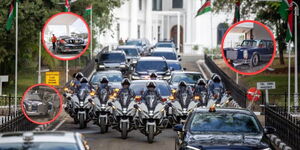Kenya's energy sector received a major boost following the government's decision to lift night inspections and crackdowns on fuel tankers.
Speaking during a National Petroleum Conference on Thursday, December 8, Energy and Petroleum Regulatory Authority (EPRA) director Edward Kinyua disclosed that the decision was made to address logistic challenges.
While also defending the lifting of the embargo on night travel for fuel tankers, he clarified that the move had affected supply in most parts of the country.
Fuel tankers posed a danger to residents as drivers were forced to park at undesignated points to comply with the government's directive.
Before the law review, they were allowed to travel between 6 am and 6 pm.
"There is a regulation we did on Transport in 2014 which had capped the travel time of petroleum tankers between 6 am and 6 pm.
"However, when we looked at supply logistics, we realised that sometimes these vehicles go into queues at the depot and are only released at 4 pm," he stated.
Kinyua added that traffic jams on various roads further derailed the tanker's efforts to deliver the product on time, necessitating the policy change.
"Before that vehicle goes through the Nairobi traffic, it is already 6 pm, and then the question was, where does that vehicle park? Another question was whether we were affecting the supply," Kinyua stated.
"After review, we allowed 24 hours transportation of petroleum products. However, some conditions were put in place," he added.
Introduced Regulations
Following the review, all fuel tankers were required to install a GPS tracker to monitor real-time movement.
The government ordered all companies to fit the tankers with reflective tapes, which he argued was key to reducing road mishaps.
Additionally, the government insisted that all drivers can only drive for eight hours.
The policy change was meant to help the energy sector flourish and tackle the challenge of fuel shortage in some parts of the country.












